We’ve been sojourning with dear friends in a small house tucked into a hidden fold of the smooth green hills of the Tarn a Garonne, venturing out each day to visit stone villages, alive with cafés, bookshops, 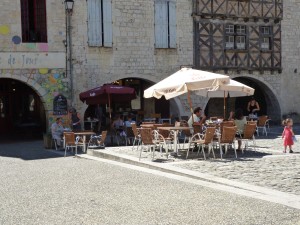
and markets where we shop for cheese, paté, bread, crisp apples, potted herbs, and thin crunchy green beans. The markets are held, as they have been for time out of mind, on village streets, and under the market pavilions built a century and more ago.
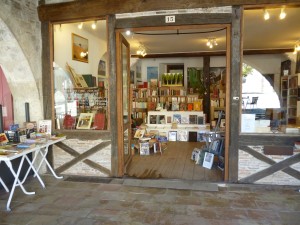
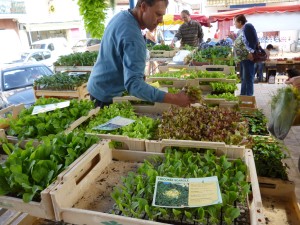
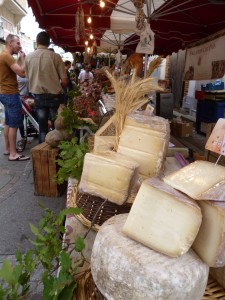
The villages are each built around twelfth century churches. In Montcuq, a Cathar keep stands on a hill, the highest point in the village, 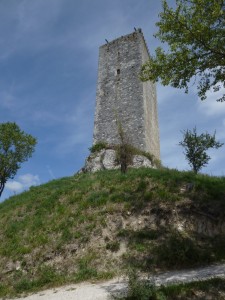 all that’s left of a castle destroyed by Simon de Montfont in the twelfth century who was dispatched with his army by the Pope to wipe out the Cathars and their heresy. The Cathars believed that man could communicate directly with God without the necessity of the Church. The Church, threatened by a loss of power, could not allow this belief to endure. Endure, however, it did, even though thousands of Cathars were killed by the sword, or burned alive.
all that’s left of a castle destroyed by Simon de Montfont in the twelfth century who was dispatched with his army by the Pope to wipe out the Cathars and their heresy. The Cathars believed that man could communicate directly with God without the necessity of the Church. The Church, threatened by a loss of power, could not allow this belief to endure. Endure, however, it did, even though thousands of Cathars were killed by the sword, or burned alive.
Aurelie, a charming young women, tells me she moved here to Montcoq with her husband and two children, that the school is good, that life here is good. The village is quiet, flower covered. Old folks play cards or boules in the shade of plane trees. 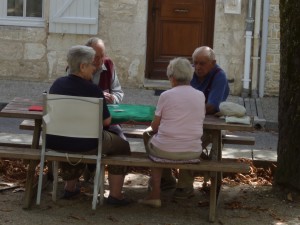 Montcuq seems far from the world of headlines, far from religious fanatics, out of the line of fire. Jean, the waiter at the café, brings Croque Monsieur sandwiches and icy drinks. Jean shrugs, says although no bombers have appeared here that no place is safe from the fanatics today.
Montcuq seems far from the world of headlines, far from religious fanatics, out of the line of fire. Jean, the waiter at the café, brings Croque Monsieur sandwiches and icy drinks. Jean shrugs, says although no bombers have appeared here that no place is safe from the fanatics today.
In Valence D’ Agen, the church has chiseled into its walls the legacy of The Enlightenment, and of the French Revolution: Liberte, Egalite, Fraternite. Liberty from the iron rule of the aristocracy and the Church, the equality of all people rich or poor, and the brotherhood of all – values that were fought for and won with blood. The French Revolution together with the American Revolution and its values, Life, Liberty, and the Pursuit of Happiness, brought an end to the divine right of kings and the rule of religion. New values brought a new world, a world only some of us live in today. That world appears to be crumbling around the edges. Religious wars once again threaten reason, the new aristocracy is seizing control, threatening liberty, equality, even life.
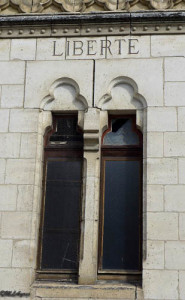
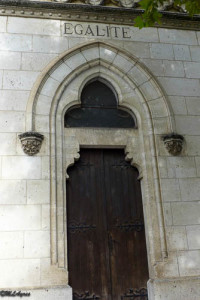
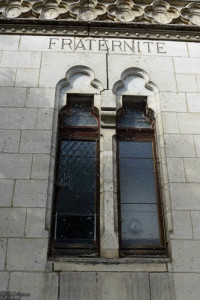
The hills and valleys here are covered with apple and pear orchards, and small fields of corn, tomatoes, sunflowers, beans, and clover, all bordered by copses of chestnut, poplar, oak, and by tangles of rose bushes, thorns, bramble and wild flowers. 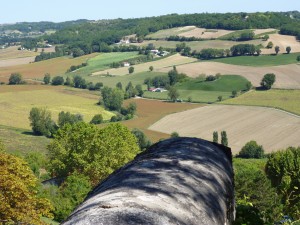 Rose hips and berries line the narrow roads. I pick and eat them, and take figs from a tree at the foot of the lane, rich as only fresh plucked fruit can be.
Rose hips and berries line the narrow roads. I pick and eat them, and take figs from a tree at the foot of the lane, rich as only fresh plucked fruit can be. 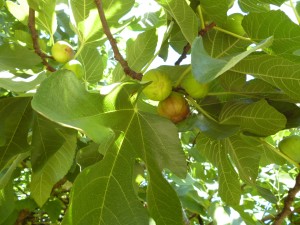 The countryside is alive with rabbits, foxes, hedgehogs, and near water, such as the Canal du Garonne, pine martens and ragondins.
The countryside is alive with rabbits, foxes, hedgehogs, and near water, such as the Canal du Garonne, pine martens and ragondins. 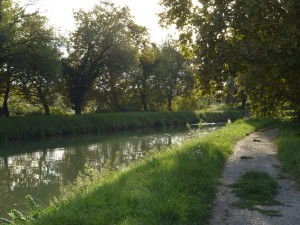 A doe freezes for a moment, watching us, then bounds into a stand of mixed deciduous trees thick with underbrush. Red tailed hawks rise on heated air, watching, hunting. A flight of pigeons swoops low into cover. This countryside has for centuries been shaped by the conscious hands of men and women. More than simply productive of produce, this countryside nourishes the soul and seems eternal. It too is threatened by many forces, and will require continued conscious effort to endure.
A doe freezes for a moment, watching us, then bounds into a stand of mixed deciduous trees thick with underbrush. Red tailed hawks rise on heated air, watching, hunting. A flight of pigeons swoops low into cover. This countryside has for centuries been shaped by the conscious hands of men and women. More than simply productive of produce, this countryside nourishes the soul and seems eternal. It too is threatened by many forces, and will require continued conscious effort to endure.
We depart tomorrow for Spain. During the past few days we’ve been reviewing our gear, stripping down to lighten our load. We leave here with only our rucksacks, a change of clothing, a few necessities, a tiny tent – no laptops. We’re setting out for for the Camino de Santiago, a pilgrim’s path across northern Spain to Santiago de Compostela. In France, the path is called the Chemin de St. Jacques. Branches of the path start in Paris, Le Puy, and other places, and pass through this area. We could start from here, but for many reasons we’ve decided to begin at St Jean Pied de Port at the foot of the Pyrenees hard on the Spanish border.
In the distant past the Church sold indulgences and promoted the myth that the bones of St. James were interred in Compostela. Thus competing with Rome for income from the thousands of pilgrims who sought redemption. The pilgrimage fell from favor during The Age of Reason and The Enlightenment, but endured in the hearts of a few over the centuries. Today, some who walk this path are religious. Most are not. Most go for personal reasons, some spiritual, others wanting a break from daily life, some just wanting some healthy exercise and to lose some weight and see the countryside close up.
The Camino de Santiago, The Chemin de St. Jacques as it’s called in France, has occupied space in my mind for thirty years and more, as has the courageous women who first told me how she saw this pilgrimage as a journey that might lead her from a place of tragedy, grief, and illness, to a new life. Over the years, while traveling in Europe for business and pleasure, I encountered many others who were on this path, and heard their stories. These encounters added to my interest in the Camino and I came to see it as more than a path, as a journey that could change people’s lives.
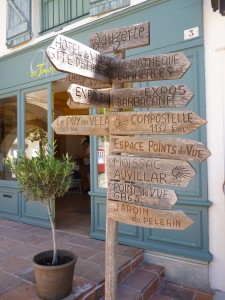
Now ML and I are setting out to the travel the Camino. Each of us has significant physical hindrances, and I do not know how much of the Camino we can actually walk. If we are unable to continue on foot, we intend to complete the journey to Compostela by other means. This intention is driven by various motives, memories being only one. My younger adoptive brother, who was devout, asked me in the hour before his death to take him with me on this journey. I carry him in my heart and will do as he asked. Like countless others, I too am going through a life change and need a time out, a retreat. Also, I’m working on a novel, a love story about two people whose lives intersect because of this journey, this pilgrimage. All my fiction is firmly grounded in actual places and events. And so, to complete this novel I must travel the Camino. You can read the first few chapters by clicking on the link on my home page.
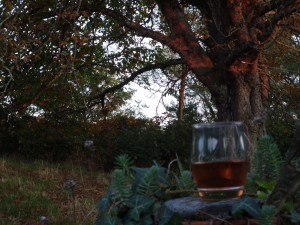
I pour a little more wine into the pickle jar, which resembles an ancient Roman drinking glass I saw in the Roman Museum in Cologne, and, being a French pickle jar, is itself a graceful work of craft. I hear an owl’s almost silent wings and send a thought to the tiny furred creature scuttling for cover in the brush, run fast, hide, survive, endure. Steve is jamming on his guitar inside. Kathy’s clear soprano accompanying. The music of the evening lifts me up, rising into the flame shot sky.

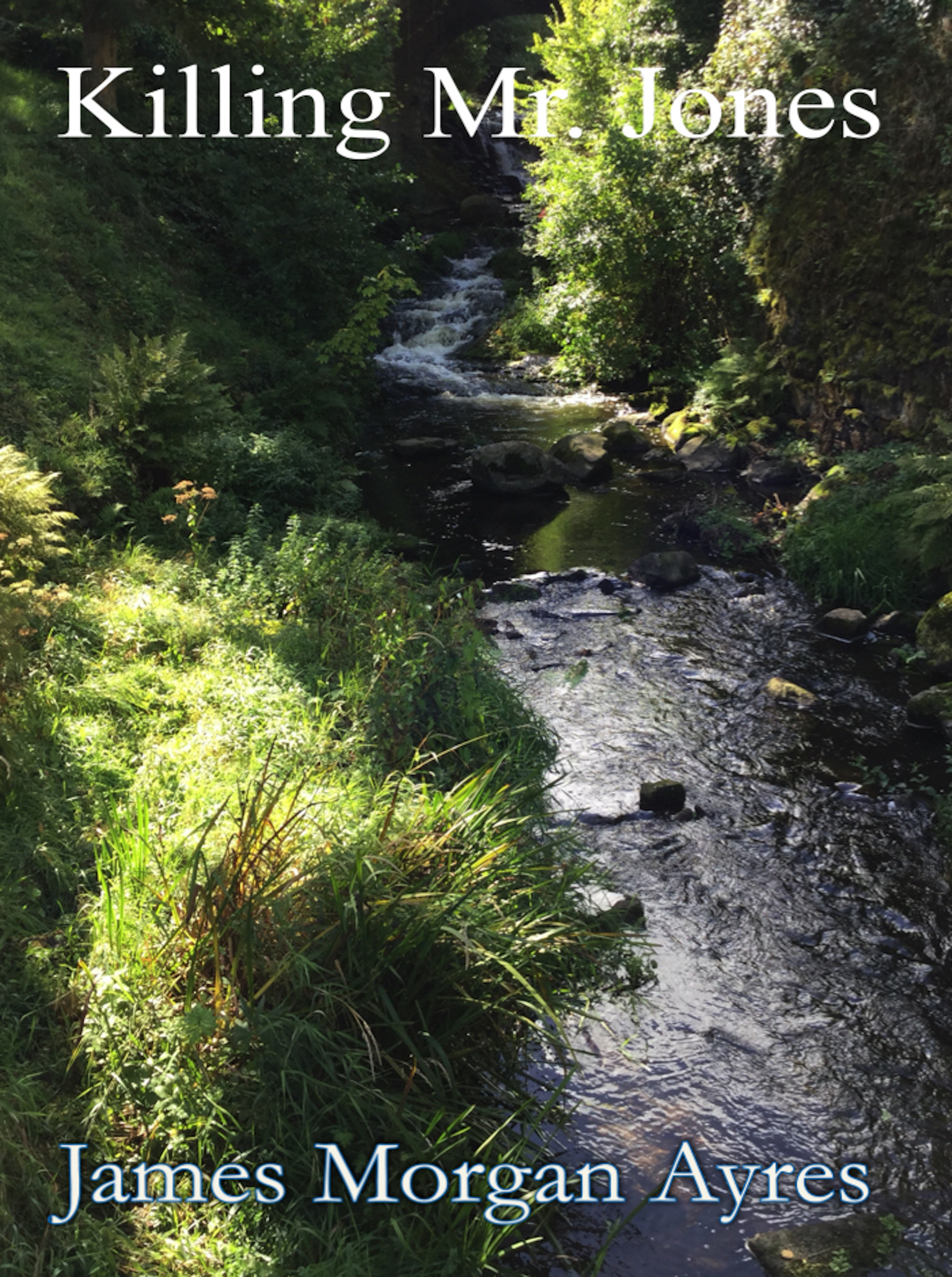 Sun, Apr 5, 2020: Killing Mr. Jones
Sun, Apr 5, 2020: Killing Mr. Jones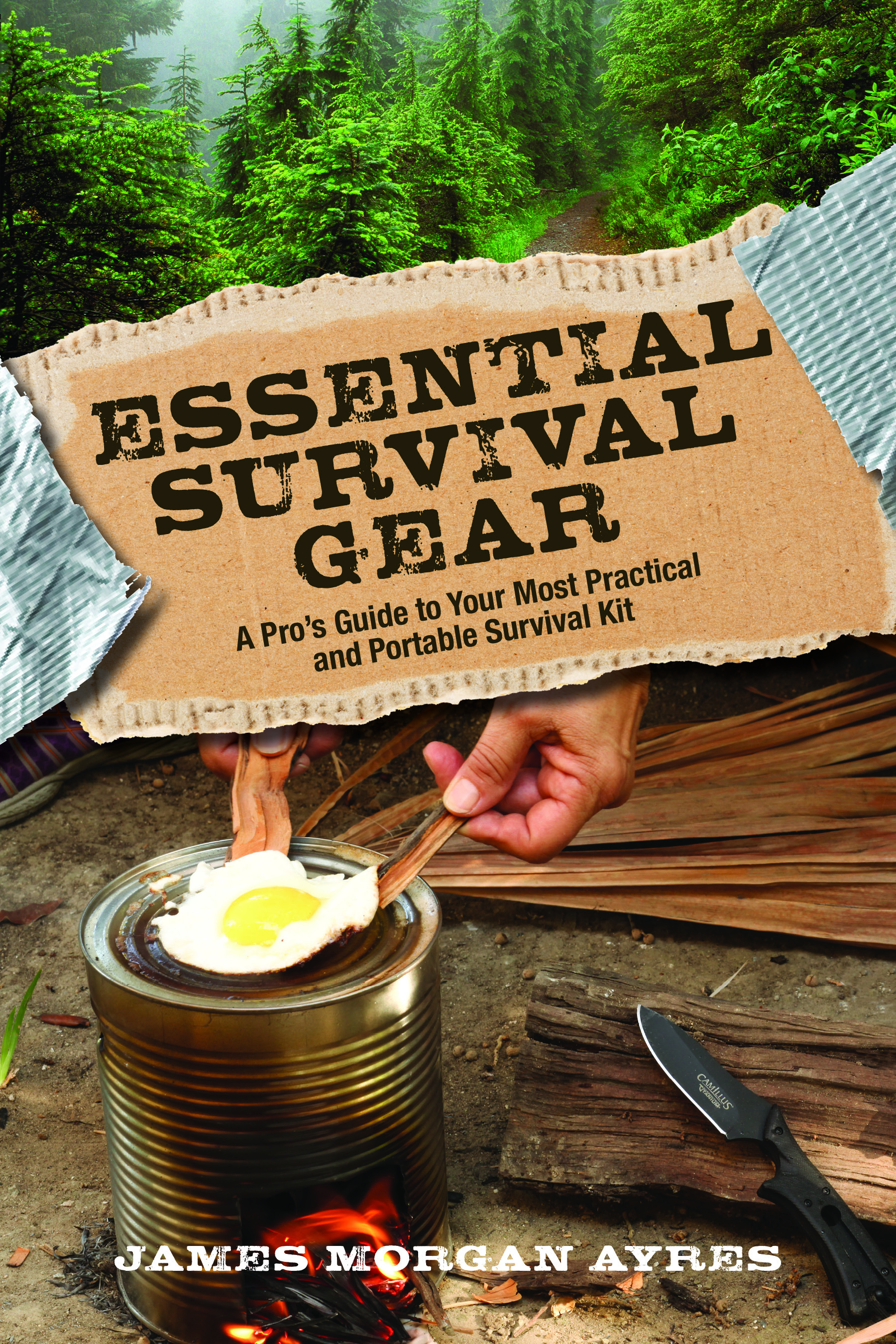 Wed, Apr 1, 2020: On Hoarding
Wed, Apr 1, 2020: On Hoarding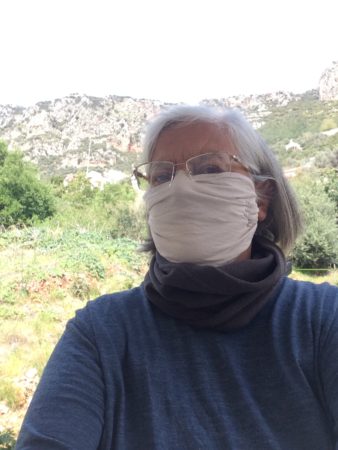 Mon, Mar 30, 2020: Masks Save Lives – Covid-19
Mon, Mar 30, 2020: Masks Save Lives – Covid-19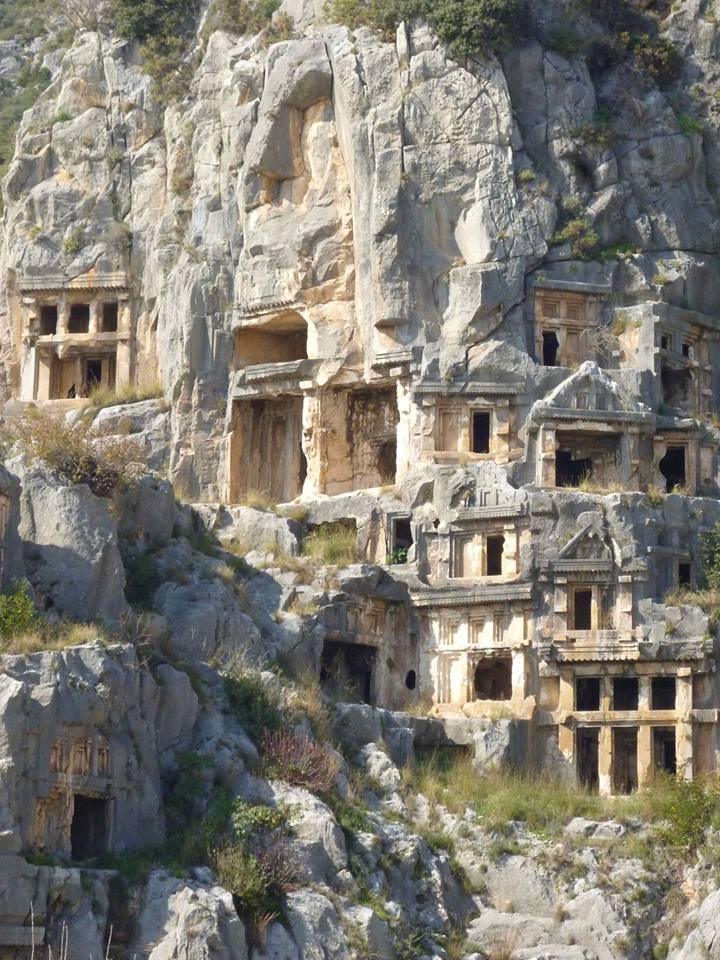 Sun, Mar 29, 2020: Visions of Apocalypse
Sun, Mar 29, 2020: Visions of Apocalypse Fri, Aug 23, 2019: Hijacked Twitter
Fri, Aug 23, 2019: Hijacked Twitter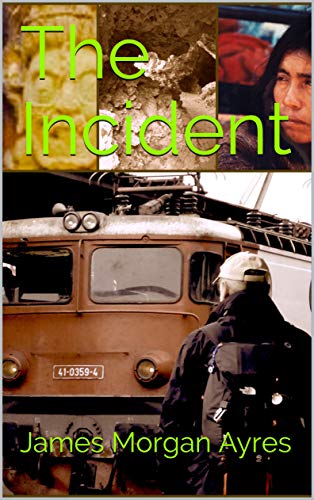 Sun, Aug 18, 2019: The Incident
Sun, Aug 18, 2019: The Incident Sat, Aug 10, 2019: Seas and Oceans Without End
Sat, Aug 10, 2019: Seas and Oceans Without End
Lovely to hear of your travels, as always. I must shamefully admit that I have not yet read you latest knife book. I have little time to read for pleasure, as the demands of graduate school are heavy.
But it’s at the top of my list. 🙂
-Stephen Poor
I’m flattered to be at the top of your list Stephen. But yes, school first.
This is inspirational stuff, James. It makes me want to hit the trail to far off places!
The road is open to all 🙂
This fascinates me. I’ll Facebook it to my friend Sylvia Madrigal, who made this journey last year.
Wish you and Myrna were here Jim.
James, Marylou,
Am thrilled to hear that you are fulfilling this long held vow and dream to walk the pilgrim path. In July I was in Cumbria, Lakes District on poetry tour (also reading tarot) with the Irish/English poet David Whyte. Many of the people on that Tour have also walked the Compostelle; shared their stories which ran the gamut from ephipany, joy to despair, hardship. But no one regretted their journey and those that did not complete the original trek, found their own completion. Adore your writing on the Tarn and observations, an area we have not visited, but I can tell you have captured it so well and it is captivating. I am sorry we did not get to see you at long last while you are in France, but I hope you will have some updates along the way and will eagerly await your novel and further news of your adventures; I know you’ve had some tough times in these last years. Bon Courage and blessings and here is a poem from Whyte’s book “Pilgrim” to launch your departure. Love to you both, your “virtual” friends, Ruthanne & Kevin
SANTIAGO
The road seen, then not seen, the hillside
hiding then revealing the way you should take,
the road dropping away from you as if leaving you
to walk on thin air, then catching you, holding you up,
when you thought you would fall – and the way forward
always in the end, the way that you came, the way
that you followed, that carried you into your future,
that brought you to this place, no matter that
it sometimes had to take your promise from you,
no matter that it always had to break your heart
along the way: the sense of having walked
from far inside yourself out into the revelation,
to have risked yourself for something that seemed
to stand both inside you and far beyond you…
Excerpt from “Santiago”
From PILGRIM: Poems by David Whyte
©2012 David Whyte
Thank you for your comments Ruthanne & Kevin, and for the poem. I do hope we can get together when we return to France.
What a beautiful essay, Jim. Art and I are thinking of you and ML as you begin this new journey and wishing you both Bon Voyage . . . And if I may infuse this with just one cultural reference from the Irish:
May the road rise up to meet you.
May the wind be always at your back.
May the sun shine warm upon your face;
the rains fall soft upon your fields and until we meet again,
may God hold you in the palm of His hand.
I just can’t seem to find any words to say it better.
Love from both of us,
Robin and Art
Thank you Robin and Art, very kind. And, I love that old poem.
Looking forward to hearing more about your adventures! Thinking of you both and sending love
Robin & Art
Seems to me that your journey is amazing ! If not always walking along with God in some way. Had that conversation with you x
Nice to hear from you Nic. I hope all is well with you.
Love to all,
James
It’s been an absolute delight to have the pleasure of yours and ML’s company for the past few weeks. Steve and I wish you well on the journey ahead and look forwards to seeing you again after this ost epic trip – bon voyage lovely friends, bon voyage. May your walks be painless and your boiled eggs plentiful
Thank you Kathy & Steve. You’ve both made our stay with you wonderful. You’ll be walking with us in our hearts.
Love to all,
James